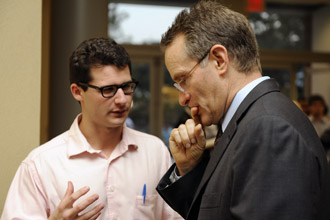Investment Expert Sees a Slow Recovery
To investment manager Howard Marks, the roots of the nation's financial crisis can be summed up in a simple observation: When people think there's no risk, that's the riskiest situation imaginable.

After his lecture at the A. B. Freeman School of Business on Tuesday (Sept. 29), Howard Marks, right, talks with Tulane business student Albert Farr. (Photo by Cheryl Gerber)
Marks, chair of investment firm Oaktree Capital Management and a respected observer of the economy, was on the Tulane uptown campus on Tuesday (Sept. 29) to deliver the R. W. Freeman Distinguished Lecture at the A. B. Freeman School of Business.
Marks said the stage for a crisis was set by strong trends toward leverage using borrowed money to invest and a willingness to assume virtually any risk in pursuit of high returns. In the collective psychology of the market, the fear of missing an opportunity eclipsed the fear of losing money.
"Fear of loss, risk aversion and caution are the things that keep markets in health and in balance," Marks said. "If people aren't afraid of losses, they will bid assets up to prices that are too high and engage in practices that are too risky."
Marks said the essentials of economic recovery de-levering the economy, replacing destroyed capital and restoring public faith are under way, but the fundamentals remain iffy at best. Sales are poor, unemployment is trending up and the nation's industrial base is shrinking.
"We will have recovery," Marks said. "I just don't think the next 10 to 15 years will be as strong as the last 10 to 15 years prior to '07."
In the end, Marks said the best advice he can give clients is to prepare for the worst but hope for the best.
"No one ever went bust preparing for tough times," Marks said. "If you prepare for tough times and they don't materialize, the worst consequence will be that somebody else will make more money than you. In my opinion, that's not the end of the world."
